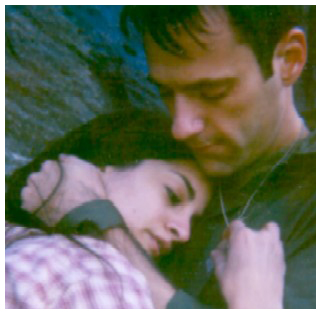Acclaimed SCREENPLAY Seeks PRODUCER
HOW HIS BRIDE CAME TO ABRAHAM
“When those who must not Love”
KANSAS CITY STAR
A PLAY FOR OUR TIME
Despite its age, ‘Bride’ holds up in the light of continuing Palestinian-Israeli troubles
By Robert Trussell
THE KANSAS CITY STAR
January 23, 2004
The two person play, “How His Bride Came to Abraham,” is performed by Michael Stock and Alyssa Cartwright.
“How His Bride Came to Abraham” is the tale of a wounded Israeli soldier and a female Palestinian terrorist thrown together in the “security zone” of southern Lebanon. It stars Alyssa Cartwright and Michael Stock.
When Karen Sunde sat down to write “How His Bride Came to Abraham” about 13 years ago, she thought she was writing a period piece.
Her tale of a wounded Israeli soldier and a female Palestinian terrorist thrown together in the “security zone” of southern Lebanon was an attempt to show both sides of a conflict that, at the time, seemed on the brink of resolution.
“The idea originally came from a producer who was commissioning me for other things,” the New York-based playwright said. “He said to me, write an Israeli-Palestinian play.”
Sunde had been in the Middle East in 1989 under United Nations auspices to learn about peace-keeping, but she couldn’t figure out a way to write a play crystallizing the conflict. Her fear was that the play would simply become a staged debate.
“You get people on one side and the other and it’s just an endless argument, and they’re both right,” Sunde said.
Then the proverbial light bulb clicked on.
“I got a notion of a way to tell the story in the theater and get both sides so involved emotionally that they would forget where they came into it or which side they are on,” she said. “I kept trying to go to sleep, and I kept having to turn on the light and making more notes. That’s one of the strongest experiences like that I’ve ever had. It just came flowing through.”
The basic idea, she said, was to depict “two very young, very innocent people who were deeply involved in the situation, and put them together and have it be one of those situations where you’ve got to get through it and you’ve got to get out of it and there’s no way. So it winds up being very passionate, dangerous and exciting, and there’s so much life in it “there’s laughter, and there’s love.”
The play was given a series of readings but did not receive a professional production until 2002 at the Playwrights Theatre of New Jersey. That was followed by a limited run last spring at the Praxis Theatre Project in New York, which generated a favorable response from critics. Variety called it “a gripping drama” and Contemporary Dramatists of London wrote that the play “indelibly etches itself upon viewers’ souls.”
The New York and New Jersey productions were classified by Equity rules as “workshop” or “showcase” productions, which allows the Unicorn Theatre to bill the production opening tonight as the play’s world professional premiere.
Cynthia Levin, the Unicorn’s producing artistic director, saw a reading of the play at the Philadelphia New Play Festival. She said she’d been looking for a script about the Israeli-Palestinian conflict for a long time.
“I was attracted to it because of the arguments on both sides, because of the fairness of the handling of the subject,” Levin said. “In any of the plays and political plays I’d seen about this subject, it was really about one side or the other. It was the Israeli perspective or the Palestinian perspective, and I didn’t want to perpetuate that because I don’t know who’s right or who’s wrong, and it doesn’t really matter who’s right or who’s wrong.”
Sunde said she was aware of the Unicorn Theatre’s reputation. As it turns out, the playwright lived in these parts in 1970. The Minnesota-raised Wisconsin native attended Kansas State University and lived in Lee’s Summit for a while. And she worked as an actor at the Lyceum Theatre in Arrow Rock, Mo.
Sunde said she was saddened by the continued relevance of the play.
“When I first wrote it, I thought, ‘I’m writing a period play,’ ” she said. “I remember it looked like the situation was going to be resolved soon. But 12 years later, in 2002, these suicide bombings were happening, and atrocities from both sides were happening. It was eerie. It feels as though the reason I wrote it was for now. It continues. You keep thinking it’s going to get better, and it keeps getting thrown back.”
The play was also prescient in a way.
“At the time I wrote it no one thought females would ever get involved (as terrorists),” she said. “People said, ‘You know, this could never happen.”’
Levin said she would love nothing better than for the play to have lost its relevance.
“I thought it was brand new,” Levin said of the reading of the play she saw in Philadelphia. “I thought the ink had just dried the day I saw it. I only wish we could be doing this as a historical piece.”
